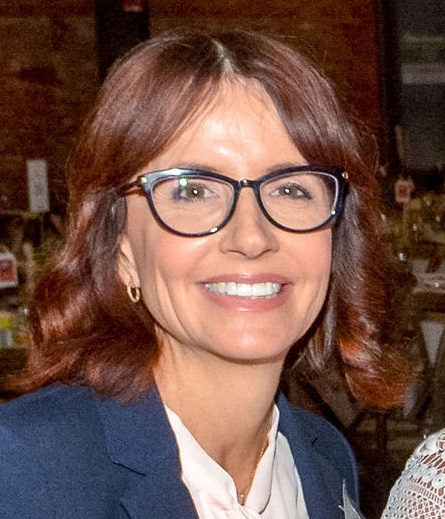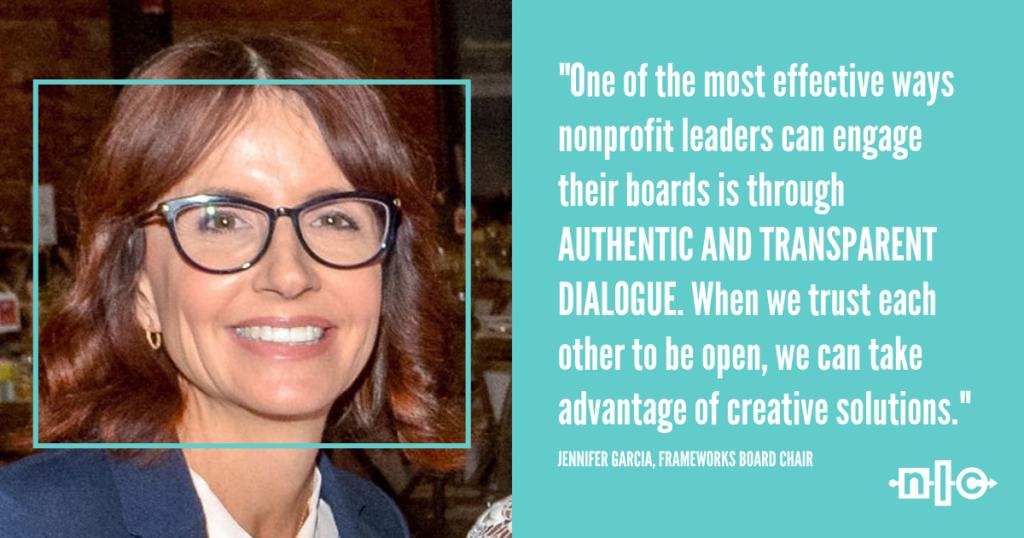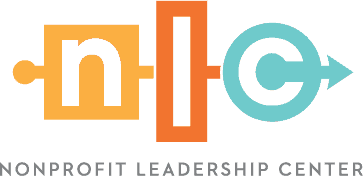As a nonprofit that exists to support other nonprofits, we believe the best lessons in nonprofit leadership come from nonprofit leaders themselves. Our 10 Questions With Series celebrates and elevates nonprofit and business leaders across the Tampa Bay region each month who are making an enduring impact on our communities. Today, we’re thrilled to introduce you to Jennifer Garcia, board chair of Frameworks.

Jennifer was a senior executive immunology specialist at Janssen Biotech, Inc./Johnson & Johnson where she was among the top 10% of sales leaders. After 21 years in the pharmaceutical/biotech industry, Jennifer started Whole Point Consulting, combining her corporate experience and development training to help individuals and organizations increase their probability of success, both personally and professionally. Early in her career, she made cold calls in advertising sales where 80% of the conversations ended in failure. Jenn credits this experience to building a resilience where she learned how to ask powerful questions and engage customers in unique ways to not only create strong relationships but also to change human behavior. As the board chair of Frameworks, Jenn brings her business experience and sales expertise to improve our nonprofit community and change lives.
Here’s what Jenn had to say about how nonprofits can build more transformational relationships, better engage their boards and more.
Q1. What advice would you share with nonprofit leaders who want to more effectively deepen relationships that lead to loyal supporters/donors?
Jenn: In my opinion, this is where for-profit and nonprofit values align: knowing your supporters — essentially your customers — is crucial. In my corporate experience, we believed every meeting was an opportunity, and we needed to be open to all outcomes. This openness is part of entering a meeting in good faith. We want to believe in what each person may bring to the discussion. What I found to be the most successful tool in leading was the ability to develop emotional connections with each person I had the pleasure of meeting. Being able to recognize their needs and place them in the center of the conversation while balancing my own goals creates the space for the opportunity to arise and solutions to be discussed. It’s this magical space created between the leader and each supporter that is the alchemy that can turn supporters into long-term donors.
Q2. As the chair of the board of directors for Frameworks, tell us a little bit about the organization’s mission and what drew you to serve this nonprofit.
Jenn: At Frameworks, we work closely with classroom teachers and school leadership to help reshape learning to ensure social, emotional and academic skills combined are an integral part of the school culture. Our mission is to empower educators and other youth services professionals with training, coaching and research-based resources to equip students with social and emotional skills.
My time as a college intern with the State Attorney’s Office Juvenile Division opened my eyes and my heart to the need for children to understand how their emotions drive their behaviors. When I learned that Frameworks gives our youth the tools to manage their emotions before their feelings take over, I knew that was the missing piece all those years ago when I was in the courtroom each day watching children struggle to explain their decision-making.
Q3. How has serving on a nonprofit board made you a more effective business leader?
Jenn: Coming from the corporate world where there is pressure to fit everyone into a specific structure with defined business practices, I had to learn a more dynamic method of leadership, in which I could bring many different backgrounds and skill sets together to support our common cause. I view my Board of Directors as my clients, and they need to be heard, valued and deserve to feel internally rewarded for their devotion to our mission. I am constantly in awe of the expertise we have in the boardroom and have learned quite a bit from each of them. This collective wisdom has been such a gift in my journey of leadership.

Q4. What advice would you give to nonprofit CEOs and leaders on how to most effectively engage their board of directors? Anything they should avoid?
Jenn: One of the most effective ways leaders can engage their boards is through authentic and transparent dialogue during board meetings and committee meetings. Trust plays a vital role in this engagement; therefore, designing the relationship to hold this value up front is important. When we trust each other to be open, we can take advantage of creative solutions. When a CEO and their board engage, they are enabling the organization to have confidence in decision-making. This creative engagement strengthens that sense of unity and provides a foundation for all to feel secure in the shared direction and goals. Avoiding a space of rigidity is important, as is the usual first rule of business — no surprises.
Q5: What’s the most important piece of advice you’d give to new professionals or emerging leaders?
Jenn: Know yourself, your strengths and your weaknesses. Hold the mirror up and work toward inner growth as much as you work toward outer solutions. The psychologist C.G. Jung called this “shadow-work,” and it enables you to be more accountable as a leader and a more authentic advocate for your people.
Q6. At NLC, we’re huge advocates of lifelong learning. What’s the one area you still want to hone or learn more about?
Jenn: I love learning! I have many things I’m still interested in learning, one of which is how to connect the individual’s creativity with the group’s activity. There’s extremely rich material on the synergy between the individual who has something to contribute and the group that will ultimately deliver the goods. This dynamic interplay between the one and the many is of special interest to me.
FIND UPCOMING LEARNING OPPORTUNITIES AT NLC HERE.
Q7. What’s the best book on leadership or professional development you think every nonprofit leader should read?
Jenn: I have three books to recommend. Dan Goleman’s “Primal Leadership,” Carol Pearson’s “Awakening the Heroes Within” and Simon Sinek’s “Start with WHY.” Dan Goleman, a keynote speaker at one of Frameworks’ Head & Heart luncheons, discusses the importance of emotional intelligence and why it’s a necessary skill for leaders. Carol Pearson shares the 12 archetypes that can aid inner development and help you understand how you’re showing up in the world. Simon Sinek popularized the notion of purpose and can help nonprofit leaders formulate their “why,” which is crucial in fundraising for their mission.
Q8. What’s something interesting about you that most people don’t know?
Jenn: I completed three triathlons, one of which I was last out of the water, but I finished! I think that’s interesting because, in my current life, no one would believe me if I told them that, especially my current workout partners. Haha!
Q9. What food could you not live without?
Jenn: Hands down, Pane Rustica’s green tea and margherita pizza.
Q10. Speaking of food, if you could share a meal with anyone currently alive today, who would it be and why?
Jenn: There are many I would like to break bread with! I was fortunate to have dinner with Carol Pearson, the author referenced above and whose work I have come to value as I appreciate her Jungian perspective on organizations. As a consultant, these principles are especially valuable to transformative leadership, and therefore, a bit more time with Carol is high on the list.
Would you or someone you know be a great leader to profile for an upcoming 10 Questions With Series article? Email us at info@nlctb.org with your recommendations.

